 Petzlover
Petzlover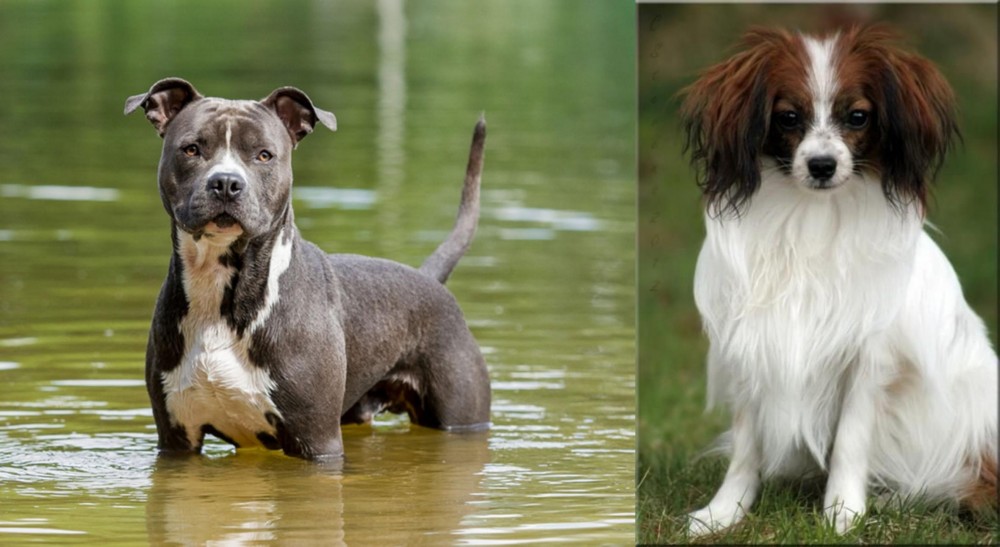 American Staffordshire Terrier is originated from United Kingdom but Phalene is originated from France. American Staffordshire Terrier may grow 20 cm / 8 inches higher than Phalene. American Staffordshire Terrier may weigh 22 kg / 49 pounds more than Phalene. Both American Staffordshire Terrier and Phalene has almost same life span. American Staffordshire Terrier may have more litter size than Phalene. American Staffordshire Terrier requires Low Maintenance. But Phalene requires Moderate Maintenance
American Staffordshire Terrier is originated from United Kingdom but Phalene is originated from France. American Staffordshire Terrier may grow 20 cm / 8 inches higher than Phalene. American Staffordshire Terrier may weigh 22 kg / 49 pounds more than Phalene. Both American Staffordshire Terrier and Phalene has almost same life span. American Staffordshire Terrier may have more litter size than Phalene. American Staffordshire Terrier requires Low Maintenance. But Phalene requires Moderate Maintenance
 The American Staffordshire Terrier is a part of all the confusion surrounding the group of “pit bulls”. The American Staffordshire Terrier is directly related to the English Bull Terrier and English Terrier. The breed of the English Staffordshire Terrier was bred in the early 19th century in the West Midlands. It was not until later that the breed came from Staffordshire. These English Staffordshire Terriers are also the source of contention by breeders who insist it was the Fox Terrier, White English Terrier, Tan and Black Terrier that are the ancestors of the English Staffordshire Terrier.
The American Staffordshire Terrier is a part of all the confusion surrounding the group of “pit bulls”. The American Staffordshire Terrier is directly related to the English Bull Terrier and English Terrier. The breed of the English Staffordshire Terrier was bred in the early 19th century in the West Midlands. It was not until later that the breed came from Staffordshire. These English Staffordshire Terriers are also the source of contention by breeders who insist it was the Fox Terrier, White English Terrier, Tan and Black Terrier that are the ancestors of the English Staffordshire Terrier.
These terriers (AKA pit bull terrier) came to the United States in the mid 1800’s. By the late 1890’s they were accepted by the United Kennel Club (UKC)as the American Pit Bull Terrier – a new and distinct breed. There were also some that were accepted into the AKC as the Staffordshire Terrier. In England they were still known as the American Staffordshire Terrier. When the AKC accepted the breed in 1936 they were given a new standard, new purpose and new group – the terrier. In 1969 the American Kennel Club recognized these dogs as American Staffordshire Terriers and refused to recognize the American Pit Bull Terrier. The name was changed to move the breed away from its characterization as a bull fighter and to distinguish it from the smaller English Staffordshire Terrier. All American Staffordshire Terriers are directly related to the American Pit Bull Terriers.
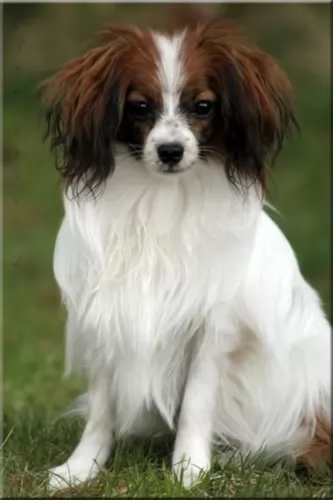 The Phalène is a toy breed, and in fact the Papillon and Phalène differ only by their ears, but are exactly the same in all other ways.
The Phalène is a toy breed, and in fact the Papillon and Phalène differ only by their ears, but are exactly the same in all other ways.
Thought to have developed in Western Europe, its exact origin isn’t clear but it is an ancient breed, as paintings seem to indicate that it has been around since the 16th century.
It is essentially a companion dog today. The dog is classified as a variety of the Papillon by the AKC, with the FCI classifying it as a separate breed.
 The American Staffordshire Terrier is a strong, powerful dog – stocky, muscular and graceful. At one point in time the American Staffordshire Terrier and the American Pit Bull Terrier were considered to be the same breed. Even today there are those that make that argument, but they have been recognized outside the AKC as separate breeds. The AKC only recognizes the American Staffordshire Terrier and not the APBT. However – even though there have been decades of separation in breeding the American Staffordshire Terrier and the American Pit Bull Terrier are the very same dogs genetically.
The American Staffordshire Terrier is a strong, powerful dog – stocky, muscular and graceful. At one point in time the American Staffordshire Terrier and the American Pit Bull Terrier were considered to be the same breed. Even today there are those that make that argument, but they have been recognized outside the AKC as separate breeds. The AKC only recognizes the American Staffordshire Terrier and not the APBT. However – even though there have been decades of separation in breeding the American Staffordshire Terrier and the American Pit Bull Terrier are the very same dogs genetically.
The American Staffordshire Terrier has a broad skull, high set ears and pronounced cheek bones. Their ears should not be cropped by AKC standards and their eyes are far apart, round and dark. With a medium sized muzzle and a heavy muscular back, they are as powerful as they look, if not more so. Most have black noses. The AmStaff has a broad, deep chest with wide set forelegs and compact feet. The tail is short and tapered and it should not be docked.
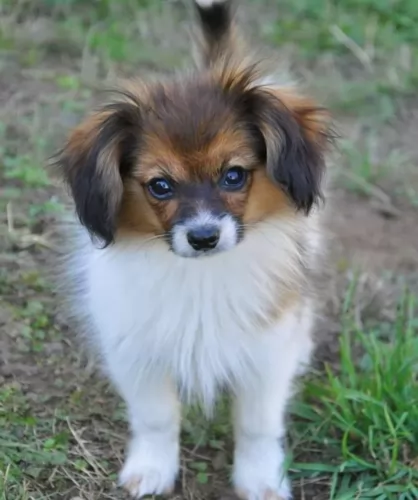 This toy breed stands at between 20 – 28cm in height and weighs around 4 – 5kg. He has floppy, silky ears and is a Papillon dog, and a Papillon with dropped ears is known as a Phalène.
This toy breed stands at between 20 – 28cm in height and weighs around 4 – 5kg. He has floppy, silky ears and is a Papillon dog, and a Papillon with dropped ears is known as a Phalène.
The dome of the head is rounded and the Phalene has a slim muzzle with bright, alert brown eyes and a black nose. The tail is well plumed and is carried over the back. The coat isn’t a double coat like many other dogs, but it is lustrous, being straight, long and smooth. The coat is available in a number of coat colors, essentially being a blend of white, tan, black and orange or fawn.
The Phalène is an intelligent dog, and they will be able to learn quickly and easily when you teach them how to sit, lie down or stay. Training and socialization is always excellent for dogs, even small ones like this as it teaches them to be obedient and well mannered.
The Phalene is a sociable, friendly dog but is inclined to be reserved around strangers. Phalènes are essentially lap dogs and they make great companions for all kinds of people as well as being great playmates for disciplined, kind children. Because he is small and calm, he makes a great pet for country- or city dwellers.
 The American Staffordshire Terrier is a loving, gentle dog that wants nothing more than to be with and please his people. Contrary to his reputation as a “killer”, this dog is actually a lover. They are great with children and want to be a part of the family. They even think they are lap dogs, regardless of their size. They are never going to be aggressive toward people and even though they are not one-person dogs, they are loyal, and they are devoted to the family and the “leader of the pack”.
The American Staffordshire Terrier is a loving, gentle dog that wants nothing more than to be with and please his people. Contrary to his reputation as a “killer”, this dog is actually a lover. They are great with children and want to be a part of the family. They even think they are lap dogs, regardless of their size. They are never going to be aggressive toward people and even though they are not one-person dogs, they are loyal, and they are devoted to the family and the “leader of the pack”.
This breed can tell who is their friend and who is not. They are not aggressive, but they will protect their own. They are courageous, confident, attentive, bold and strong-willed. The AmStaff gets along with other dogs most of the time, but they will never back down from a challenge and should never be left unsupervised with another dog. They should not be loose in a neighborhood or at a dog park. No matter how much you trust your American Staffordshire Terrier they can be killers in any fight with another dog.
In addition to this you must socialize and train your AmStaff. You need to be the pack leader and be in control. The AmStaff wants to please you so for a strong leader they will respond positively to positive training. They are intelligent and pick up quickly on what you want them to do. However, they are incredibly strong physically so training them to heel and walk with you obediently is a must. A well trained and exercised American Staffordshire Terrier is a happy dog and a loyal family dog.
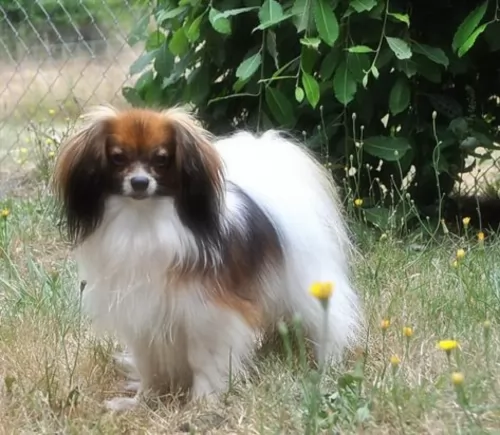 The Phalene is such a sweet little dog, and you can definitely count him as as ‘man’s best friend’. He just loves to be wherever his human family is, lapping up their attention indoors but also loving being with them outdoors. When well trained and socialized, these dogs make splendid playmates for children too.
The Phalene is such a sweet little dog, and you can definitely count him as as ‘man’s best friend’. He just loves to be wherever his human family is, lapping up their attention indoors but also loving being with them outdoors. When well trained and socialized, these dogs make splendid playmates for children too.
Small though he is, he makes a good watch dog too and he will bark to warn his human family of danger. Give him the love and care he so rightly deserves, and he promises to make you a splendid pet and companion.
 For the most part the American Staffordshire Terrier, like most of the “pit bulls” is a hearty, healthy dog. They have a few tendencies that breeders should test for including hip dysplasia, allergies, and heart issues. They can test for Cerebellar ataxia, which has affected the AmStaff with a progressive decline in their ability to control their muscles and coordination.
For the most part the American Staffordshire Terrier, like most of the “pit bulls” is a hearty, healthy dog. They have a few tendencies that breeders should test for including hip dysplasia, allergies, and heart issues. They can test for Cerebellar ataxia, which has affected the AmStaff with a progressive decline in their ability to control their muscles and coordination.
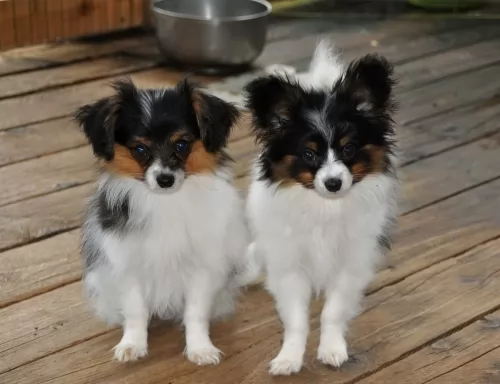 Your jaunty little Phalene can live to be up to 12 or 15 years of age if well cared for. Even so, there are always some of the more common dog illnesses worth knowing about, and we look at a few -
Your jaunty little Phalene can live to be up to 12 or 15 years of age if well cared for. Even so, there are always some of the more common dog illnesses worth knowing about, and we look at a few -
Any dog can get epilepsy – when your pet suddenly has a seizure or fit for no apparent reason. It can be disturbing to see, but with medication your pet can live a normal life.
Always keep a check on your pet’s eyes because there are a few eye diseases that can affect your pet and these are cataracts, progressive retina atrophy and entropion. Thankfully a veterinary ophthalmologist can help with the best treatment.
 feed You can feed your American Staffordshire Terrier either commercially purchased food or food you make yourself if the quality is high, nutrition is good, and the amount eaten is determined by the owner. Do not free feed. The AmStaff has the tendency to become obese. Its ok to use treats for training and rewards, as long as its use is controlled.
feed You can feed your American Staffordshire Terrier either commercially purchased food or food you make yourself if the quality is high, nutrition is good, and the amount eaten is determined by the owner. Do not free feed. The AmStaff has the tendency to become obese. Its ok to use treats for training and rewards, as long as its use is controlled.
As previously mentioned the American AmStaff Terrier has a tendency toward a few health issues. Hip Dysplasia – this condition causes a lot of pain and disability. It leads to different types of arthritis and degenerative joint disease. Cardiac Issues – Congenital heart disease consists of vessel malformation and lesions.
The AmStaff can be susceptible to Autoimmune Thyroiditis. This is a form of hypothyroidism developed by dogs. It is usually seen between 2 and 5 years of age. Continual retesting is recommended.
This is the most dangerous disease possibility that the American Staffordshire Terrier faces. There is a test for this condition which causes the AmStaff to display an inability to control their muscles and a loss of balance, to the point of falling. This is a progressive disease that often leads to euthanasia. The Staffordshire Terrier Club of America suggests that AmStaffs carrying the NCL genes should never be bred.
The American Staffordshire Terrier is an energetic, and athletic dog that loves to play and needs plenty of exercise. This breed is oriented to people and should never be left alone in the yard all day as a way for her to exercise. She needs you to play with her. If you cannot do this, then you should not own this breed of dog. This breed also loves to play canine sports. They thrive on games like dock diving, agility and obedience competitions. They excel at search and rescue. These are competitive dogs that want nothing more then to please their people.
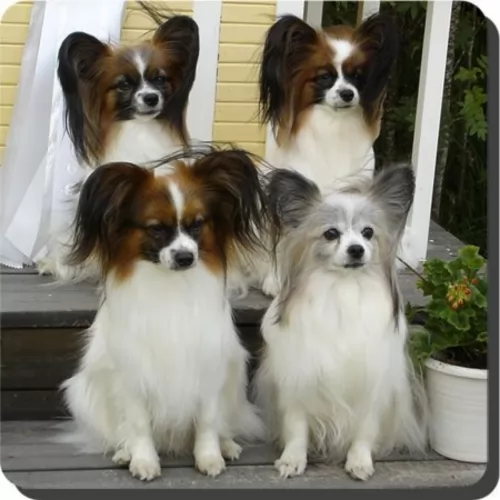 These are energetic little dogs and will require getting a regular dose of exercise. He loves a walk and being allowed off his leash for a good run. He also loves ball games. Exercise is important for small dogs like this to ward off obesity.
These are energetic little dogs and will require getting a regular dose of exercise. He loves a walk and being allowed off his leash for a good run. He also loves ball games. Exercise is important for small dogs like this to ward off obesity.
These little dogs will need to have their ears checked and cleaned if you want to avoid ear infections. If you’re not sure how to clean the inside of the ears, rather leave it to an expert who can show you how its done. Small dogs always need to have their teeth checked regularly. He will also need to have his nails trimmed.
To maintain the long, silky coat, brush your dog at least twice a week. Some Phalene dog owners take their pet to the vet to have the coat professionally groomed and trimmed.